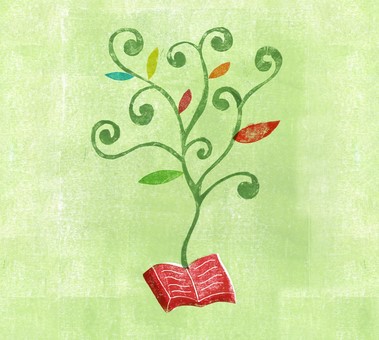In the digital age, books and blogs may seem like distant cousins in the realm of written content. However, a closer look reveals a fascinating and mutually beneficial relationship between the two. This article delves into the dynamics of this relationship, exploring how books and blogs coexist, complement each other, and shape the literary landscape.

The Influence of Books on Bloggers:
Books have long served as wellsprings of inspiration for bloggers. Classic literature, contemporary novels, and niche non-fiction works often find their way into the minds of bloggers, sparking ideas and providing valuable insights. Here’s how books influence the blogging world:
Content Ideas:
Books can serve as a well of content ideas for bloggers. A thought-provoking novel may inspire a series of analytical blog posts, while a how-to book can lead to practical, instructional articles.
Research Material:
Bloggers often turn to books for research. Whether it’s delving into historical accounts for a historical blog or referencing scientific texts for a science-oriented blog, books provide credibility and depth to blog content.
Literary Analysis:
Literature blogs, in particular, thrive on dissecting and discussing books. Bloggers review, critique, and analyze literature, creating a bridge between the literary world and a broader online audience.
Book Recommendations:
Blogs that feature book reviews or reading lists are a treasure trove for bookworms seeking their next literary adventure. Bloggers help spread the love of reading and recommend books that resonate with their audience.
The Blogosphere’s Impact on Books:
Blogs have become influential platforms for book promotion, discussion, and discovery. They have reshaped the book industry and the way authors connect with their readers. Here’s how blogs impact the world of books:
Book Reviews:
Book bloggers and reviewers wield significant influence. Their honest reviews can make or break a book’s reputation, and authors and publishers actively seek out bloggers for reviews to reach wider audiences.
Author Platforms:
Blogs are valuable tools for authors to connect with their readers. Many authors maintain blogs to share insights into their writing process, offer sneak peeks of upcoming works, and engage with their fanbase.
Self-Publishing Success:
Blogs have played a pivotal role in the success of self-published authors. Through blogging, writers can build an online following and market their books directly to their readers.
Literary Communities:
Blogs foster literary communities where readers, writers, and bloggers come together to discuss books, exchange recommendations, and celebrate the written word. These communities help books find new readers.
Blogging About Books: A Thriving Niche:
Blogging about books has evolved into a thriving niche within the blogosphere. Book bloggers, commonly known as “booktubers” (video bloggers) and “bookstagrammers” (Instagram bloggers), have created dedicated online spaces for literary enthusiasts. They share reviews, reading challenges, and book-related content, connecting readers worldwide.
Book blogs cater to diverse tastes, from young adult fiction to historical non-fiction, and their influence extends to social media platforms. Hashtags like #Bookstagram and #BookTube have millions of posts, showcasing the visual appeal of books and encouraging conversations around reading.
The Book-to-Blog Journey: Author Blogs and Book Adaptations:
Authors, too, have harnessed the power of blogging. Many established and emerging authors maintain blogs to connect with readers and provide behind-the-scenes glimpses into their writing process. Author blogs often serve as extensions of their books, offering additional content and insights.
Additionally, the relationship between books and blogs extends to the realm of book adaptations. When a book is adapted into a film or television series, bloggers play a crucial role in generating buzz, reviewing adaptations, and discussing the fidelity of the on-screen version to the original text. Their opinions can influence the perception of these adaptations and affect their commercial success.
Conclusion: The Interwoven Worlds of Books and Blogs:
Books and blogs, despite their differences in format and distribution, share a symbiotic relationship that enriches the literary landscape. Books inspire bloggers, while blogs promote and discuss books, creating a dynamic exchange of ideas, recommendations, and literary passion.
As technology continues to evolve, this relationship will likely grow stronger, shaping the way we read, write, and connect in the digital age. Whether you’re an author seeking to engage with your readers, a bookworm looking for your next great read, or a blogger eager to explore the vast world of literature, the interwoven worlds of books and blogs offer endless opportunities for discovery and literary discourse.

